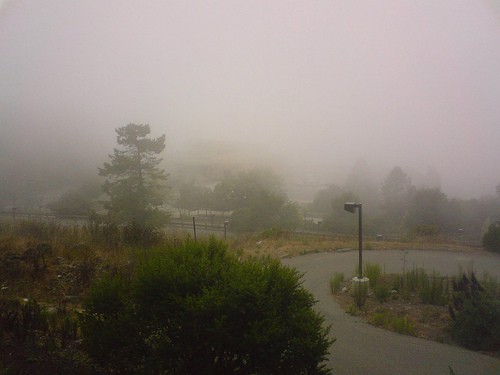
Battling the Beast
A couple weeks ago, I made a brief visit to Berkeley, California, for a wedding. My wife, Julie, had to take a conference call the first morning after we arrived, so I decided to get some work done myself. I didn’t bring a computer, so “work” couldn’t mean e-mail replying (the standard instinct in this situation).
Instead, I decided to log some hard focus hours on what I like to call The Beast: a particularly vexing theory problem that my collaborators and I have been battling for many months.
I got some coffee and headed toward the Berkeley campus on foot. It was early, and the fog was just starting its march down the Berkeley hills (as shown above).
I eventually wandered into a eucalyptus grove:
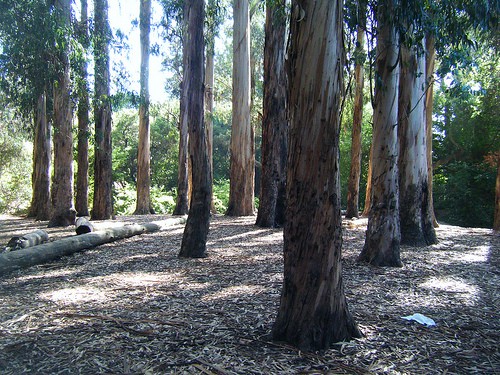
Once there, I sipped my coffee and thought.
Our existing strategy for The Beast included a complicated algorithm which none of us looked forward to analyzing. Deploying a trick I learned while a grad student, I avoided needing to understand why the complicated algorithm worked by instead turning my attention to understanding why simpler strategies failed (I’m surprised by how often the study of things that break lead to simple things that don’t).
After only an hour, which included a strategic fill-up at the Free Speech Cafe, I had an idea for a more concise (and easier to analyze) algorithm that seemed to work.
I realized, however, that there’s a limit to the depth you can reach when keeping an idea only in your mind. Looking to get the most out of my new insights, and inspired by my recent commitment to the textbook method, I trekked over to a nearby CVS and bought a 6 x 9 stenographer’s notebook.
(I discovered this notebook style when writing HIGHSCHOOL SUPERSTAR, much of which I outlined while walking by the Charles River — they’re sturdy and easy to use when not at a desk).
I then forced myself to write out my thoughts more formally:
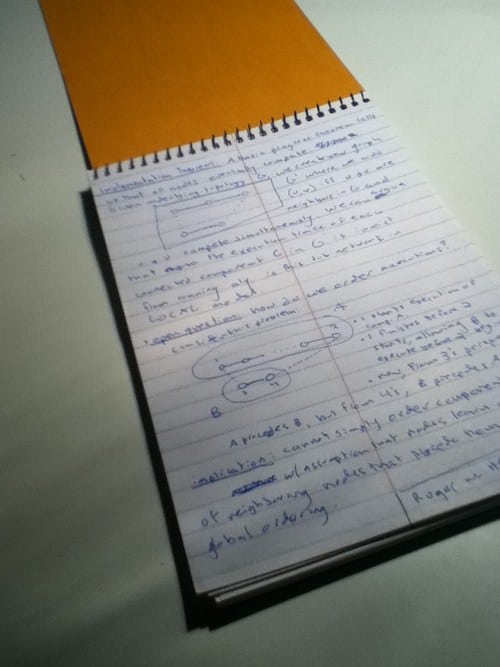
This combination of pen and paper notes with the exotic context in which I was working ushered in new layers of understanding. Our battle with The Beast continues, but in the latest draft of our solution in progress, these Berkeley simplifications play a useful role.
Adventure Work
I’m telling this story because it sparked a realization. Back in my student advice days, I was a promoter of adventure studying — a tactic where you tackle schoolwork in exotic locations, such as here…
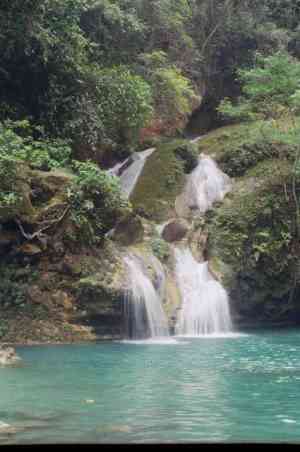
…where one of my readers prepared for an important Chinese exam (which he aced), or here…
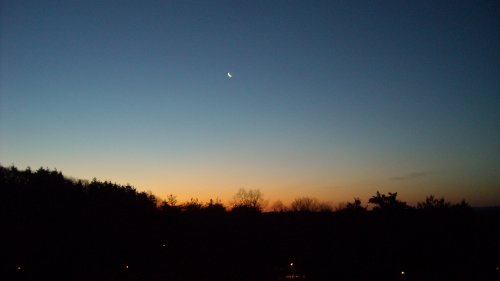
…which is a view from the rooftop of a campus building where another of my readers would sneak out to crack tricky problem sets.
The motivation for adventure studying was two-fold:
- Changing your context makes the work seem fresh and allows you to tackle it with new creativity and energy.
- Going somewhere exotic separates you from common distraction urges.
My experience in Berkeley helped me realize that this same adventure tactic should work for non-student work as well. When faced with a core responsibility — something that draws on and develops the ability that makes you rare and valuable — the same two motivations listed above apply to adventure work just as much as adventure studying.
This explains why a couple hours outside in the eerily unchanging northern California weather could produce more insight than days of work back at my office.
Do you adventure work? If so, share your story and a photo…
#####
This post is part of my Craftsman in the Cubicle series which explores strategies for building a remarkable working life by mastering a small number of rare and valuable skills. Previous posts include:
- Henri Poincare’s Four-Hour Work Day
- You Probably (Really) Work Way Less Than You Think
- Experiments with the Textbook Method
- You Are What You Write: The Textbook Method for Ultra-Learning
- Work Less to Work Better: My Experiments with Shutdown Routines
#craftsmanincubicle

I really identified with this post – Adventure Studying is a great idea!
I can’t help but mention that there’s a whole major consisting of adventure studying… it’s called Geology 🙂 As the years go by, I am more and more thankful that it cast its spell over me when I was an undergrad, and that I did a field-based project in geologic mapping for my dissertation. Adventures in a mountain range in the Death Valley region were perfectly suited for me when I was 25, and I’m glad I didn’t spend grad school *entirely* in a lab or library.
That said, I have to admit that the idea of `picking an adventure major’ is considerably more complicated than I’ve just made it out to be. True, I did field work when I was a grad student, and it involved hiking up and down mountains, 4WD-ing, and even a bit of helicopter work, but there was *vastly* more time spent in classrooms, labs, and libraries. The field work adventure was surrounded by a giant `frame’ of schoolwork, lab work, qualifying exams, and all the usual grad-school stuff. It wasn’t really an example of what Cal means by `adventure studying’, but it certainly had its share of adventure.
I should also be careful not to sound like I’m saying `follow your passion’ in the overly simplistic way that Cal’s written about. To some extent, yes, I did that, when I discovered geology. However… I was already a big science nerd, I had a decent amount of general science knowledge, and a bit of experience in hiking and climbing. Geology wasn’t so much `a passion discovered’ as `the last piece of the puzzle falling into place’. And more importantly, it wasn’t so much `discovering passion’ as `discovering what I was suited to’. I *thought* I was suited to a physics major, with the dream of doing research in cosmology, but it turned out I was actually suited to geology and teaching. That discovery was as valuable as the discovery of a `passion’.
Sorry for the rambling comment, but I just have to give an attaboy to any blog post that talks doing academic work on a steno pad while walking outdoors, and which contains the phrase `Adventure Studying’ 🙂
This one time my wife’s work took her out of town for a few weeks. It was only a few hours away by car, so one weekend I rented a car and drove out to visit. We were then hit with huge snow storm. The roads were unsafe for days, but I had an internet connection and so I was able to SSH into my work machine. In those days free from interruptions, I did some of the most important work of my entire master’s thesis project and extensively tested a code that would become a central building block in two papers we ultimately published.
When I was studying for my GREs, I used a hybrid flashcard/memory palace/SuperMemo system for the verbal portion. (The easiest way to hack the verbal portion is to massively increase your vocabulary. I went from the 80th to 98th percentile.) I found that walking around Oxford while reviewing flashcards, though it did make me seem a bit like a crazy person, made studying very dry material downright enjoyale.
I try to get away a lot. I have worked from temples, coffee shops, apartments, the beach, a cabin, a house in the country, all in many different countries. See my site for a long list of countries and many photographs of where I’ve worked. I guess my favorite locations have included a penthouse apartment in Bangkok, and a small cottage on Perhentian Island in Malaysia. I was particularly productive working from a balcony of a hotel in Madeira. My least productive location is always “the office”. Maybe it’s time for companies to rethink the whole concept of work environment. Good article, thanks for posting!
What type of work do you do?
I wrote the bulk of a major grant application earlier this summer from the balcony of a hotel in Madeira.
Totally unrelated to this post (there’s no discussion board), but I didn’t want to e-mail Cal, because he may not have enough time to respond to me, so I’d be happy if anyone responds to me. I’ve read Cal’s “How to Become a Straight-A Student”. In the book, Cal explains that you should attend all your lectures because learning via lectures is twice as efficient as learning from the book. He also says that you should focus on copying down examples in technical courses. I’m a first-year Engineering student and at my University, all my profs post everything (notes, examples, definitions, etc.) online. My Linear Algebra professor has a heavy accent (communication barrier for me) and quite frankly, I’m learning nothing in her class. She also seems to go incredibly fast. Today is my third day at University and I have been copying down as much as possible. I give priority to my examples then defintions and then the rest. Sometimes, my linear algebra professor goes so fast that I can only manage to copy down the example question and answer down before she moves on. I feel like this all copying is preventing me from understanding the content because I’m too focused on writing. What would be your advice? Should I just print the notes beforehand and comes to class with the notes. This way, I don’t have to write down anything except if I want to comment about an example or ask a question. I might be able to learn more, because I can focus on the content more. On the flip side, I won’t write anything, so it’s possible that it will be harder to understand. I believe Cal suggested in the book that writing down information is a VERY inefficient way of learning, so I can’t think of any drawbacks to printing the notes beforehand. Advice extremely appreciated!
Also, if I do decide to continue to copy everything down as I currently am, should I copy multiple identical (numbers change in the questions) examples? Or should I just stick to copying only one example that demonstrates the concept and then copying any additional examples that are more complicated? Or maybe I should only copy the most complicated example?
Sorry if I’m asking obvious questions here, but I’ve made some seriously bad time management decisions in the past, so I don’t trust my judgement.
Ignore my previous post! There’s no edit button.
Totally unrelated to this post (there’s no discussion board), but I didn’t want to e-mail Cal, because he may not have enough time to respond to me, so I’d be happy if anyone responds to me. I’ve read Cal’s “How to Become a Straight-A Student”. In the book, Cal explains that you should attend all your lectures because learning via lectures is twice as efficient as learning from the book. He also says that you should focus on copying down examples in technical courses. I’m a first-year Engineering student and at my University, all my profs post everything (notes, examples, definitions, etc.) online. My Linear Algebra professor has a heavy accent (communication barrier for me) and quite frankly, I’m learning nothing in her class. She also seems to go incredibly fast. Today is my third day at University and I have been copying down as much as possible. I give priority to the examples then definitions and then the rest. Sometimes, my linear algebra professor goes so fast that I can only manage to copy down the example question and answer down before she moves on. I feel like this all copying is preventing me from understanding the content because I’m too focused on writing. What would be your advice? Should I just print the notes beforehand and comes to class with the notes? This way, I don’t have to write down anything unless I want to comment about an example or ask a question. I might be able to learn more, because I can focus on thinking more. On the flip side, I won’t write anything, so it’s possible that it will be harder to understand. I believe Cal suggested in the book that writing down information is a VERY inefficient way of learning, so I can’t think of any drawbacks to printing the notes beforehand. Advice extremely appreciated!
Also, if I do decide to continue to copy everything down as I currently am, should I copy multiple identical (numbers change in the questions) examples? Or should I just stick to copying only one example that demonstrates the concept and then copying any additional examples that are more complicated? Or maybe I should only copy the most complicated example?
Sorry if I’m asking obvious questions here, but I’ve made some seriously bad time management decisions in the past, so I don’t trust my judgement.
The adventure method works for writers, too! I have done some of my best writing on airplanes. I’ve also written in parks, in neighborhood cafes and while sitting in a theatre, waiting for a speech to start. More writers need to GET AWAY FROM THEIR DESKS to be able to write. Based on your post, Cal, I’m going to start looking for some really adventurous locations. (Am wondering about the observation deck from a super-tall building in my hometown…..)
Great article. Even just taking a stroll can produce ideas that refuse to emerge when one is staring at a computer, willing words to come.
This is my favourite method of getting stuff done. I wrote 4000 good draft quality words of a committee report while sitting under the roof overhang of a wood cabin in Algonquin park one morning. It was raining, and utterly, devastatingly gorgeous scenery surrounded me, but it was not distracting. No internet, just me and my laptop. Most efficient writing I’ve done all year. Wish I had a photo!
Going to the cottage — also in the middle of nowhere with no internet — is another strategy of mine. Though it does lead one to want to relax and sit on the dock drinking beer all day…
Hi Cal, I am a technical writer/programmer. I worked on a contract basis which gave me a lot of freedom – hence I was able to travel quite a bit and work remotely. When I worked for MySQL everyone that worked for the company was a remote worker – most of the people I worked with I still don’t know where they were geographically! 🙂 I guess I stumbled on the approach of “leverage valuable skills to buy flexibility/freedom” – it works. I also tried the “follow your passion” route for a while – that didn’t work. Recently the need to support my daughter through University clipped my wings a bit, but I expect to go back to the location independent/adventure working lifestyle fairly soon now. I’m also massively pimping my “valuable skills” in my current job, so I look forward to leveraging that to live the more flexible way of life soon enough.
I’m also looking forward to reading your book on the subject – which I preordered! 🙂
Madeira is just about the perfect climate for me – all year round. I love the place. I got into a little routine of going up onto the balcony early in the morning, with a coffee, and banging out a couple of hours of high quality work. Can’t wait to go back! I stayed at the Madeira Regency for a while. I love that place – although it’s not what you’d call trendy! 😉
For notes, I encourage everyone to move away from producing hoards of legal/steno pads. I keep a 0.5″ 3-ring binder with graph paper in it (great for all notes). Any and all thoughts are recorded with the date. When the binder is full I move the pages to a larger 3-ring binder for archiving. The pages can be scanned and searched. Alternatively you could use a tablet with good handwriting recognition software. I’m poor so 3-ring binders work for now.
I totally agree that switching locations can have a huge impact on your productivity and make work fun! (Admittedly I recently did some great project planning while getting a pedicure–those massage chairs do wonders for producing relaxed creativity!)
One other helpful thing I’ve found is to simply switch locations in the same building. So if you work from home that could look like sitting on your back porch or at the kitchen table. And if you’re confined to an office area, it could be sitting on a chair in the lobby or perhaps on a bench outside.
The change in setting allows your mind to switch between activities more quickly.
To your brilliance!
Elizabeth Grace Saunders
I am big fan of those Northern Californian eucalyptus groves, so it’s a pity that they’re considered a non-native species to the area and are occasionally being removed.
I’ve been exploring shared work spaces in San Francisco through loosecubes.com. It’s a very cool way to bring a new sense of context to your work and bump into some interesting people.
Yes. Do this regardless of how you solve your dilemma.
Edit:
Removing the “just” from your question:
Yes. Do this regardless of how you solve your dilemma.
Mundane and more exciting adventures are both part of my manuscript-writing routine. A twice-weekly stop to map library (whose basement location has shrouded it from the hordes of undergrad crammers) and a cycle of coffee shops keeps the view changing. Once or twice a year, I’ll find a cabin or lodge in the woods for a long weekend. Sitting by a fire at a log-hewn table is reward enough to keep me chugging along on a draft.
My favorite adventure work is walking around Manhattan with my iPhone 4s. Just walking and taking photos.
Ideas appear, as well as clarity. I’m looking for the surprise and often getting it.
https://www.flickr.com/photos/robbomb/7946863046/in/photostream
Let me second the suggestion above–which I haven’t located again–of a chat room or a message board. When something happens that I think you’d be interested in, e.g., Amazon sends me your new book two weeks before the official release date, I don’t want to send you an email that you won’t see for another two weeks and that will interrupt your work. Normally, I just let it go. In this instance, I interrupted the last thread, instead. That is obviously not the ideal solution. Is the solution a message board or chat room for posts related to your earlier themes?
I really identify with this. I am a UK academic and have written several book chapters at conferences in exotic places. The best was at Lake Ohrid in Macedonia, where I got a whole chapter written in three days, when I only anticipated “making a start…” There really is something about changing location in this way, and I love the idea of calling it “adventure studying”, thereby formalising the concept.
Beautiful images!
Totally agree with this! I spent a few weeks studying commutative algebra on an island off the coast of Italy. Learned it way better than I would have in my grad student office on campus.
Now I get it! Had a co-worker who, when he felt overrun with work, would pack his papers and laptop and just relocate to another area of the same building. I was generally surprised at how quickly he came back to his desk all caught up.
Were you there for the Pober wedding? That was a few weeks ago in Berkley (I know California’s huge, but its oftentimes a small world…)
A few years late, but I only just discovered this blog, and this post struck me. It’s cliché among field geologists that an 8 hour day in an office is drudgery and painful, while a 10 or 12 hour day in the field is tiring but not overly so. This may be part of it.
Field work is inherently adventurous. “In the field” means outside, working on some site, in a dynamic environment that’s sometimes beautiful, usually dangerous, and always interesting. Field geologists trade stories about the worst conditions we’ve been in, and the work we’ve had to do in them–drilling in sub-zero temperatures, hiking for miles through deserts with no water, that sort of thing. It keeps your mind engaged far more than merely sitting in an office staring at a computer screen!